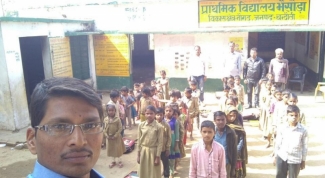
Union Minister for Agriculture & Farmers’ Welfare, Rural Development & Panchayati Raj, Narendra Singh Tomar has said the Soil Health Card Scheme has helped India achieve surplus capacity in foodgrain production. Inaugurating the National Workshop on Soil Health Card (SHC) Day here today, he said the soil health is vital to boosting agricultural production.
The Minister said the vagaries of weather pose a new challenge before the country. The spurt in onion prices last year arose due to unseasonal rains. The agricultural scientists are constantly engaged in finding solutions. Tomar said, “Our schemes should not remain confined to files, farmers should gain out of it. I am of the firm belief our farmers will overcome this challenge heeding to the advice of agricultural scientists and soil analysis. More than 11 crore SHCs have been issued in two phases since the scheme was launched five years ago. Government is making efforts to set up Soil Testing Labs (STLs) on the patterns of Model Village. Still much more needs to be done.”
Tomar informed that under this scheme Soil Health Cards are provided to all farmers at an interval of 2 years. These cards contain status of soil health and also soil test based nutrients recommendations for important crops. He appealed to the farmers to adopt the recommendations of Soil Health Cards for efficient use of fertilizers and improving farm income.
He further said the Government will soon launch a Tilahan Mission to make the country self-reliant in oil seed production. In recent years, following shortage of pulses, Prime Minister Narendra Modi has called for focus on pulses production and today India has attained self-sufficiency in pulses as well, he added.
The Soil Health Card Day commemorates the day Soil Health Card Scheme was launched by Prime Minister Narendra Modi on February 19, 2015 at Suratgarh, Rajasthan. During cycle –I (2015-17), 10.74 crore Soil Health Cards and during cycle – II (2017-19), 11.74 crore Soil Health Cards have been distributed to farmers. The Government has spent more than Rs.700 crores on the SHC scheme since its launch five years ago.
So far 429 new static Soil Testing Labs (STLs), 102 new mobile STLs, 8752 mini STLs and 1562 village level STLs have been sanctioned under the scheme since 2014-15. Out of these sanctioned labs, 129 new static Soil Testing Labs (STLs), 86 new mobile STLs, 6498 mini STLs and 179 village level STLs are already established.
The objectives of the Soil Health Card (SHC) scheme are to issue soil health cards to farmers every two years so as to provide a basis to address nutritional deficiencies in fertilization practices. Soil testing is developed to promote soil test based on nutrient management. Soil testing reduces cultivation cost by application of right quantity of fertilizer. It ensures additional income to farmers by increase in yields and it also promotes sustainable farming.
The scheme has been introduced to assist State Governments to issue SHCs to all farmers in the country. SHC provides information to farmers on nutrient status of their soil along with recommendation on appropriate dosage of nutrients to be applied for improving soil health and its fertility.
During 2019-20, a pilot project ‘Development of Model Villages’ has been taken up where soil samples collection has been taken up at individual farm holding with farmer’s participation instead of sample collection at grids.Under the pilot project, one village per block is adopted for holding based soil testing and organization of larger number of demonstrations up to a maximum number of 50 demonstrations (1 ha each) for each adopted village.
So far 6,954 villages have been identified by the States in which against the target of 26.83 lakh samples / Soil Health Cards, 21.00 lakh samples have been collected, 14.75 lakh samples analysed and 13.59 lakh cards distributed to farmers. Apart from this, 2,46,979 demonstrations and 6,951 Farmer Melas approved to States.
During the next five years, it is proposed to cover four lakh villages under individual farm holding soil sampling & testing, organize 2.5 lakh demonstrations, setting up of 250 village level soil testing labs, strengthening 200 soil testing labs with Intensively Coupled Plasma (ICP) spectrophotometer and promotion of micro-nutrients in 2 lakh hectare area.
A 2017 study by the National Productivity Council (NPC) found that the SHC scheme has promoted sustainable farming and led to a decrease of use of chemical fertilizer application in the range of 8-10%. Besides, overall increase in the yield of crops to the tune of 5-6% was reported due to application of fertilizer and micro nutrients as per recommendations available in the Soil Health Cards.
Awareness among farmers is being stepped up by coordinated efforts of Departments of Agriculture Cooperation and Farmers Welfare, Fertilisers backed by technology and network of Krishi Vigyan Kendras of Indian Council of Agriculture Research. Farmers can track their samples, print their Cards etc at Common Service Centres also at the Farmers Corner of www.soilhealth.gov.in and fulfill the mantra of Swastha Dhara to Khet Hara (if the soil is healthy, the fields will be green).
मृदा स्वास्थ्य कार्ड योजना ने खाद्यान्न उत्पादन में अतिरिक्त क्षमता हासिल करने में मदद की: तोमर
केंद्रीय कृषि एवं किसान कल्याण और ग्रामीण विकास व पंचायती राज मंत्री नरेंद्र सिंह तोमर ने कहा है कि मृदा स्वास्थ्य कार्ड योजना ने भारत को खाद्यान्न उत्पादन में अधिशेष क्षमता प्राप्त करने में मदद की है। आज यहां मृदा स्वास्थ्य कार्ड (एसएचसी) दिवस पर एक राष्ट्रीय कार्यशाला का उद्घाटन करते हुए उन्होंने कहा कि कृषि उत्पादन को बढ़ावा देने के लिए मृदा स्वास्थ्य बहुत महत्वपूर्ण है।
उन्होंने कहा कि मौसम की अनिश्चितताएं देश के सामने एक नई चुनौती पेश कर रही हैं। पिछले साल बेमौसम बरसात के कारण ही प्याज की कीमतों में उछाल आया था। कृषि वैज्ञानिक लगातार इस संबंध में समाधान खोजने में लगे हुए हैं। तोमर ने कहा, “हमारी योजनाओं को केवल फाइलों तक ही सीमित नहीं रहना चाहिए बल्कि किसानों को इसका लाभ मिलना चाहिए। मुझे दृढ़ विश्वास है कि हमारे किसान, कृषि वैज्ञानिकों की सलाह से और मिट्टी के विश्लेषण से इस चुनौती को पार पा सकेंगे। पांच साल पहले इस योजना के शुरू होने के बाद से दो चरणों में 11 करोड़ से अधिक मृदा स्वास्थ्य कार्ड (एसएचसी) जारी किए गए हैं। सरकार आदर्श ग्राम की तर्ज पर मृदा परीक्षण प्रयोगशाला (एसटीएल) स्थापित करने के प्रयास कर रही है। अभी भी इस दिशा में बहुत कुछ किए जाने की जरूरत है।”
तोमर ने कहा कि सरकार जल्द ही देश को तेल बीजों के उत्पादन में आत्मनिर्भर बनाने के लिए तिलहन मिशन शुरू करेगी। उन्होंने कहा कि हाल के वर्षों में दालों की कमी के बाद प्रधानमंत्री नरेंद्र मोदी ने दालों के उत्पादन पर ध्यान केंद्रित करने का आह्वान किया और आज भारत ने दालों में भी आत्मनिर्भरता प्राप्त कर ली है।
पूरे दिन चली इस कार्यशाला की शुरुआत विशेष सचिव (कृषि, सहकारिता एवं किसान कल्याण विभाग) द्वारा स्वागत भाषण से की गई। इसके बाद संयुक्त सचिव (आईएनएम) ने मृदा स्वास्थ्य कार्ड योजना और विभिन्न राज्यों में इसके कार्यान्वयन का अवलोकन प्रस्तुत किया (प्रस्तुति देखने के लिए यहां क्लिक करें)। भारतीय कृषि अनुसंधान संस्थान के मृदा विज्ञान प्रमुख ने एकीकृत पोषक तत्व प्रबंधन के महत्व के बारे में बताया। विभिन्न राज्यों के किसान प्रतिनिधियों और कृषि अधिकारियों ने मृदा स्वास्थ्य कार्ड और मॉडल ग्राम कार्यक्रम पर अपने अनुभव साझा किए। एकीकृत पोषक तत्व प्रबंधन पर आईसीएआर के अलावा उत्तर प्रदेश, गुजरात, कर्नाटक, झारखंड, तेलंगाना, मध्य प्रदेश और मेघालय के वरिष्ठ अधिकारियों द्वारा प्रस्तुतियां दी गईं। इफको ने मृदा स्वास्थ्य कार्ड कार्यक्रम के बारे में अपनी कंपनी की पहल को लेकर एक प्रस्तुति दी। इस कार्यक्रम को उर्वरक विभाग के सचिव ने भी संबोधित किया। इस कार्यशाला में विभिन्न राज्यों के लगभग 300 किसानों ने हिस्सा लिया।
इस योजना के तहत 2014-15 से लेकर अब तक 429 नई स्टैटिक सॉयल टेस्टिंग लैब्स (एसटीएल), 102 नई मोबाइल एसटीएल, 8752 मिनी एसटीएल और 1562 ग्राम स्तरीय एसटीएल मंजूर की जा चुकी हैं। इन स्वीकृत प्रयोगशालाओं में से 129 नई स्टैटिक सॉयल टेस्टिंग लैब्स (एसटीएल), 86 नई मोबाइल एसटीएल, 6498 मिनी एसटीएल और 179 ग्राम स्तरीय एसटीएल अब तक स्थापित की जा चुकी हैं।
मृदा स्वास्थ्य कार्ड योजना का उद्देश्य हर दो साल में किसानों को मृदा स्वास्थ्य कार्ड जारी करना है ताकि खाद डालने के तरीकों में पोषण संबंधी कमियों को दूर करने के लिए एक बुनियाद प्रदान की जा सके। पोषक तत्व प्रबंधन के आधार पर मिट्टी के परीक्षण को बढ़ावा देने के लिए ही मृदा परीक्षण को विकसित किया गया है। उर्वरकों का सही मात्रा में उपयोग करवाकर मृदा परीक्षण खेती की लागत को कम करता है। यह पैदावार में वृद्धि करके किसानों की अतिरिक्त आय सुनिश्चित करता है और टिकाऊ खेती को भी बढ़ावा देता है।
मिट्टी के रासायनिक, भौतिक और जैविक स्वास्थ्य की गिरावट को भारत में कृषि उत्पादकता में ठहराव के कारणों में से एक माना जाता है।
सरकार पोषण आधारित सब्सिडी (एनबीएस) योजना को भी लागू कर रही है और उर्वरकों के संतुलित उपयोग के लिए अनुकूलित और मज़बूत बनाए हुए उर्वरकों को बढ़ावा दे रही है। अब तक 21 उर्वरकों को एनबीएस योजना के तहत लाया जा चुका है। वर्तमान में सरकार द्वारा अधिसूचित 35 अनुकूलित और 25 मज़बूत बनाए हुए उर्वरक उपयोग में हैं।
2019-20 के दौरान 'मॉडल ग्रामों का विकास' नाम की पायलट परियोजना शुरू की गई जहां मिट्टी के नमूनों का संग्रह ग्रिड में करने के बजाय किसान की भागीदारी के साथ उसके खेत में किया जाता है। इस पायलट परियोजना के अंतर्गतप्रत्येक ब्लॉक से एक गांव को गोद लिया जाता है ताकि मृदा परीक्षण किया जा सके और बड़ी संख्या में प्रदर्शनों का आयोजन किया जा सके, जिसमें प्रदर्शनों की अधिकतम सीमा 50 प्रति हैक्टेयर है।
राज्यों के द्वारा अब तक 6,954 गांवों की पहचान की जा चुकी है जहां 26.83 लाख नमूनों / मृदा स्वास्थ्य कार्डों के लक्ष्य के मुकाबले 21.00 लाख नमूने एकत्र किए जा चुके हैं, 14.75 लाख नमूनों का विश्लेषण किया जा चुका है और 13.59 लाख कार्ड किसानों में वितरित किए जा चुके हैं। इसके अलावा, राज्यों द्वारा 2,46,979 प्रदर्शनों और 6,951 किसान मेलों को मंजूरी प्रदान की गई है।
2017 में राष्ट्रीय उत्पादकता परिषद् (एनपीसी) के द्वारा किए गए एक अध्ययन में पाया गया कि एसएचसी योजना के माध्यम से टिकाऊ खेती को बढ़ावा दिया गया है और इसके द्वारा 8-10 फीसदी तक रासायनिक उर्वरकों के उपयोग में कमी आई है। इसके अलावामृदा स्वास्थ्य कार्ड में उपलब्ध सिफारिशों के अनुसार, उर्वरक और सूक्ष्म पोषक तत्वों का उपयोग करने के कारण फसलों की उपज में 5-6 फीसदी की वृद्धि दर्ज की गई है।
कृषि सहयोग और किसान कल्याण विभागों के मिले-जुले प्रयासों के माध्यम से किसानों में जागरूकता बढ़ाई जा रही है, जिसको भारतीय कृषि अनुसंधान परिषद के कृषि विज्ञान केंद्रों द्वारा तकनीकी रूप से और नेटवर्क का समर्थन मिल रहा है। किसान अपने नमूने को ट्रैक कर सकते हैं, अपने कार्ड का कॉमन सर्विस सेंटरों पर और किसान कॉर्नर www.soilhealth.gov.in पर प्रिंट ले सकते हैं और ‘स्वस्थ धारा तो खेत हरा’ के मंत्र को पूरा कर सकते हैं।











